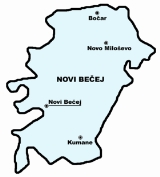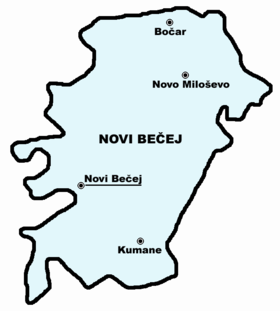
Novi Becej
Encyclopedia

Central Banat District
Central Banat District is a northeastern district of Serbia. It lies in the region of Banat, in the autonomous province of Vojvodina. It has a population of 208,456...
of Vojvodina
Vojvodina
Vojvodina, officially called Autonomous Province of Vojvodina is an autonomous province of Serbia. Its capital and largest city is Novi Sad...
, Serbia
Serbia
Serbia , officially the Republic of Serbia , is a landlocked country located at the crossroads of Central and Southeast Europe, covering the southern part of the Carpathian basin and the central part of the Balkans...
. The town has a population of 14,406, while Novi Bečej municipality has 26,881 inhabitants.
Name
Its name means "new Bečej". In the past it was known simply as "Bečej", while the current town of BečejBecej
Bečej is a town and municipality located in the South Bačka District in Vojvodina, Serbia. The town has a population of 25,703, while Bečej municipality has 40,877 inhabitants. It is multiethnic town, with Hungarians and Serbs as largest ethnic groups...
, across the river Tisa, was in the past known as "Stari Bečej" ("old Bečej") and today is known as "Bečej".
In Serbian
Serbian language
Serbian is a form of Serbo-Croatian, a South Slavic language, spoken by Serbs in Serbia, Bosnia and Herzegovina, Montenegro, Croatia and neighbouring countries....
, the town is known as Novi Bečej (Нови Бечеј), in Hungarian
Hungarian language
Hungarian is a Uralic language, part of the Ugric group. With some 14 million speakers, it is one of the most widely spoken non-Indo-European languages in Europe....
as Törökbecse, in Croatian
Croatian language
Croatian is the collective name for the standard language and dialects spoken by Croats, principally in Croatia, Bosnia and Herzegovina, the Serbian province of Vojvodina and other neighbouring countries...
as Novi Bečej, and in German
German language
German is a West Germanic language, related to and classified alongside English and Dutch. With an estimated 90 – 98 million native speakers, German is one of the world's major languages and is the most widely-spoken first language in the European Union....
as Neu-Betsche.
Serbian and Hungarian language are officially used by municipal authorities.
History
12th century BC ornitho-morphic pendants were found in the town.The Dacians inhabited the region before the Roman conquest in the 2nd-1st Century BC.
The town was first mentioned in 1091 during the Hungarian Kingdom. In the 15th century, it was a possession of the Serbian despot Đurađ Branković. During the Ottoman
Ottoman Empire
The Ottoman EmpireIt was usually referred to as the "Ottoman Empire", the "Turkish Empire", the "Ottoman Caliphate" or more commonly "Turkey" by its contemporaries...
rule (in 1660/6), it was populated by ethnic Serbs
Serbs
The Serbs are a South Slavic ethnic group of the Balkans and southern Central Europe. Serbs are located mainly in Serbia, Montenegro and Bosnia and Herzegovina, and form a sizable minority in Croatia, the Republic of Macedonia and Slovenia. Likewise, Serbs are an officially recognized minority in...
. Ottomans managed her as "Beçe" between 1552-1718. Until 1918 its part of the Hungarian Kingdom, after it is part of the Kingdom of Serbs, Croats and Slovenes and subsequent South Slavic
South Slavs
The South Slavs are the southern branch of the Slavic peoples and speak South Slavic languages. Geographically, the South Slavs are native to the Balkan peninsula, the southern Pannonian Plain and the eastern Alps...
states except German occupation between 1941-1944.
Inhabited places
Novi Bečej municipality includes the town of Novi Bečej and the following villages:- BočarBocarBočar is a village located in the Novi Bečej municipality, in the Central Banat District of Serbia. It is situated in the Autonomous Province of Vojvodina...
- KumaneKumaneKumane is a village located in the Novi Bečej municipality, in the Central Banat District of Serbia. It is situated in the Autonomous Province of Vojvodina...
- Novo MiloševoNovo MiloševoNovo Miloševo is a village located in the Novi Bečej municipality, in the Central Banat District of Serbia. It is situated in the Autonomous Province of Vojvodina...
Ethnic groups in the Novi Bečej municipality
- SerbsSerbsThe Serbs are a South Slavic ethnic group of the Balkans and southern Central Europe. Serbs are located mainly in Serbia, Montenegro and Bosnia and Herzegovina, and form a sizable minority in Croatia, the Republic of Macedonia and Slovenia. Likewise, Serbs are an officially recognized minority in...
(69.94%) - Hungarians (19.22%)
- Roma (3.59%)
- YugoslavsYugoslavsYugoslavs is a national designation used by a minority of South Slavs across the countries of the former Yugoslavia and in the diaspora...
(2.1%)
All settlements in the municipality have an ethnic Serb majority.
Ethnic groups in the Novi Bečej town
- SerbsSerbsThe Serbs are a South Slavic ethnic group of the Balkans and southern Central Europe. Serbs are located mainly in Serbia, Montenegro and Bosnia and Herzegovina, and form a sizable minority in Croatia, the Republic of Macedonia and Slovenia. Likewise, Serbs are an officially recognized minority in...
(61.36%) - Hungarians (26.63%)
- Roma (2.68%)
- YugoslavsYugoslavsYugoslavs is a national designation used by a minority of South Slavs across the countries of the former Yugoslavia and in the diaspora...
(2.44%)
Historical population of the town
- 1961: 16,378
- 1971: 16,075
- 1981: 16,091
- 1991: 15,404
- 2002: 14,452
Twin cities
MezőtúrMezotúr
Mezőtúr is a town of Hungary, in the county of Jász-Nagykun-Szolnok, 88 m. southeast of Budapest by rail. It possesses important potteries. Large herds of cattle are reared on the communal lands, which are productive also of wheat, rapeseed and maize...
, Hungary
Hungary
Hungary , officially the Republic of Hungary , is a landlocked country in Central Europe. It is situated in the Carpathian Basin and is bordered by Slovakia to the north, Ukraine and Romania to the east, Serbia and Croatia to the south, Slovenia to the southwest and Austria to the west. The...
Štúrovo
Štúrovo
Štúrovo is a town in Slovakia, situated on the River Danube. Its population in 2005 was 11,172.The town is situated opposite the Hungarian city of Esztergom. The Mária Valéria bridge connects the settlements. The bridge was destroyed in 1944 during World War II, but reconstructed in...
, Slovakia
Slovakia
The Slovak Republic is a landlocked state in Central Europe. It has a population of over five million and an area of about . Slovakia is bordered by the Czech Republic and Austria to the west, Poland to the north, Ukraine to the east and Hungary to the south...
Bataysk
Bataysk
Bataysk is a city in Rostov Oblast, Russia, located southwest of Rostov-on-Don. Population: Bataysk has gained international attention since unveiling a "monument that shows a man's hand gripping a nubile female breast", which officials say "will bring family happiness to men who touch...
, Russia
Russia
Russia or , officially known as both Russia and the Russian Federation , is a country in northern Eurasia. It is a federal semi-presidential republic, comprising 83 federal subjects...

